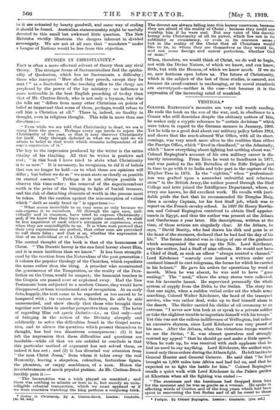STUDIES IN CHRISTIANITY.•
Fear is often a more effectual solvent of theory than any rival theory. The stronger forms of Saeramentalism find the spiritu- ality of Quakerism, which has no Sacraments, a difficulty those who interpret " How shall they preach, except they be sent ? " as a limitation of the teaching office to the clergy are perplexed by the power of the lay ministry : no influence is more noticeable in the best English preaching of to-day than that of Mr. Clutton-Brock, who is not only a layman, but who (he tells us) " differs from many other Christians on points of belief so important that some of them, perhaps, would refuse to call him a Christian at all." There is, indeed, no finality in thought, even in religious thought, This tells in more than one direction:— "Even while we are told that Christianity is dead, we see it rising from the grave. Perhaps every age needs to reject the Christianity of the past, so that it may discover Christianity for itself. Only through disbelief in what we are told do we attain to belief in that truth which remains independent of all maa's expression of it."
The key to the impression produced by the writer is the entire vitality of his thinking. All that he writes is positive and real ; " in this book I have tried to state what Christianity is to us now." It is necessary, he recognizes, to rid it of beliefs that can no longer be held—as to what these are opinions will differ ; but before we do so " we must state as clearly as possible its eternal essence." Perhaps it is not always possible to observe this time-order : the removal of the auperincumbent earth is the pries of the bringing to light of buried treasure, and the risk of disturbing elements of worth in the process must be taken. But the caution against the misconception of values which " doth so easily besot us " is opportune :—
" What seems incredible to us may seem so only because we mis-express it to ourselves. All through the ages men, indi- vidually and in common, have tried to express Christianity ; and, if we know that they have never quite succeeded, we shall be less impatient of each other's attempts at expression, even when they are unintelligible to us. It is when men pretend that their own expressions are perfect, that other men are provoked to call them false ; and that is so, whether the expression is that of an individual or of a Church."
The central thought of the book is that of the humenneea of Christ. " The Docetio heresy is the one fatal heresy about Him, and it is more insidious than we know." It has been strength- ened by the reaction from the Naturalism of the past generation ; it colours the popular theology of the Churches, which repudiate the name rather than the thing. A preacher who accentuated the genuineness of the Temptation, or the reality of the Dere- liction on the Cross, would be suspect; the humanist touches in the Gospels are passed over or explained away. Had the New Testament been subjected to a modern Censor, they would have disappeared, or been transformed out of recognition. At an early date, happily, the text came to be regarded as too sacred to be tampered with ; its various strata, therefore, lie side by side unreconciled, and show clearly that those who brought them together saw Christ in another perspective than ours. The habit of regarding Him sub specie Deitatis—i.e., as God only—and of bringing in the notion of the Divinity abruptly and arbitrarily to solve the difficulties found in the Gospel narra- tive, and to silence the questions which present themselves to thought, has had two disastrous consequences : (1) it has left the impression that these difficulties and questions are insoluble—while all that we are entitled to conclude is that this particular method of argument has not solved them, as indeed it has not ; and (2) it has diverted our attention from " the man Christ Jesus," from whom it taker, away the real Humanity, leaving a shapeless, colourless, featureless figure, the phantom, or empty semblance, of a man. Hence the invertebratenees of much popular pietism. As Mr. Clutton-Brock forcibly puts it :- " The Incarnation was a trick played on mankind ; and there was nothing to admire or love in it, but merely an unin- telligible celestial transaction, which we must applaud as if we were courtiers watching the king perform a conjuring trick.
• Studs. t Christeaelty. By A. Cluttoa•Broek. London: Constable. (U. ed. aet1 The devout are always falling into this heresy unawares, because they are afraid of the reality of Christ ; because they could not worship him if he were real. But any taint of this docetic heresy robe Christianity of all its power, whirls lies not in its sublimity or consistency, or even in its common sense ; but in the reality of the Christ that all Christians would like to be, in whom they see themselves as they would be, and not some foreign and unreal perfection, whether God or man."
When, therefore, we would think of Christ, we db well to begin, not with the Divine Nature, of which we know, and can know, little, but with the Human, of which we know much. If we do so, new horizons open before on The future of Christianity,
which is the subject of the last of these studies, is assured, not because its creed-content is unchanging, or its moral standards are stereotyped—neither is the case—but because it is the expression of the increasing mind of mankind.


































 Previous page
Previous page